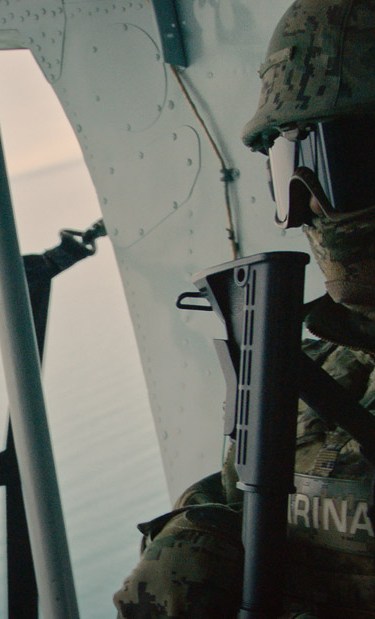There’s always a staple documentary with an environmental message in the mix of 100 plus movies playing at the Sundance Film Festival. A few years ago, the festival premiered the sequel to An Inconvenient Truth, and a decade earlier, it screened the controversial documentary The Cove, which showed the plight of dolphins hunted off the coast of Japan. They are movies with a purpose, agitprop for nature made to move its audiences with a heartbreaking story and perhaps inspire some action on its subject’s behalf.
Following in the footsteps of its predecessors, Sea of Shadows is a documentary with a sense of urgency, a complicated story that spans several countries and features a cute animal whose precarious fate hangs in the balance. The movie is about the last remaining vaquitas in the wild, a rare and delightfully sweet looking sea creature that also happens to be the world’s smallest species of whale. There has never been a successful attempt to keep a vaquita in captivity, so as the numbers dwindle from less than 50 to barely more than a baker’s dozen, the pressure’s on to save the animal from extinction.
However, the vaquita’s story is not so simple. Off the coast of Mexico in the Sea of Cortez where the vaquita calls home, the precious few left in the wild are caught in illegal nets set up by Mexican cartels for another rare fish, the totoaba, whose bladder are so prized by the Chinese mafia, the fish has become known as the “cocaine of the sea.” The movie dives into these murky waters with advocates and journalists for an extensive look at how conservationists, local fishermen, and the Mexican government are working to save the vaquita while trying not to disrupt the delicate ecosystem above and below the Sea of Cortez.
Director and cinematographer Richard Ladkani, whose previous documentary The Ivory Game and Sea of Shadows were both executive produced by Leonardo DiCaprio, fashions the story into something more thrilling than your typical nature doc. There are blurred out faces, voice scramblers and secret meetings in this quest to save the vaquita. The editing moves at a rapid-fire pace, switching between the different sides of the narrative swiftly, highlighting the short amount of time left to save the vaquita from certain doom.

One of the most striking features of Sea of Shadows is the film’s sleek cinematography. If it weren’t for the film’s ominous music, its sweeping drone shots of the nearby cactus-filled desert and aqua green sea water would look like a travel ad for the town of San Felipe. Unfortunately, the documentary quickly informs the audience that not everything is as it seems in this sleepy fishing village now that the cartels have taken an interest. Ladkani seems to use the latest digital cameras and drones to create images that are beautifully sharp, and he takes great care to capture the area’s natural warm light bouncing off the blue sea and the bright floodlights hitting to the darkened ocean at night. Even hazy night sequences of missions to stop illegal fishing look crisp and are edited to enhance the suspense.
There are a number of nail-biting scenes in the movie, but perhaps none of them hit as hard as the Mexican government-sanctioned attempt to set up a vaquita rescue center in the middle of the ocean. A passionate veterinarian from the States is among the crew trying to successfully capture a vaquita to save in captivity. This bittersweet moment gives the audience perhaps its very first look at the rare species, but things don’t go according to plan. The music stops, and all that’s heard is the teams’ frantic pleading with a vaquita to hold on while they attempt CPR.
That’s just one thrilling moment of many in Sea of Shadows, which snagged enough votes to win this year’s audience award in the world cinema documentary competition at Sundance. Not long after its award announcement, National Geographic bought the documentary so that many more viewers will hear of the vaquita’s cautionary story. While the movie’s message may come too late to save the vaquita, Sea of Shadows may still raise awareness about the plight of other sea creatures still under threat from illegal nets sweeping the bottom of the ocean, killing everything unfortunate enough to swim in its wake.




